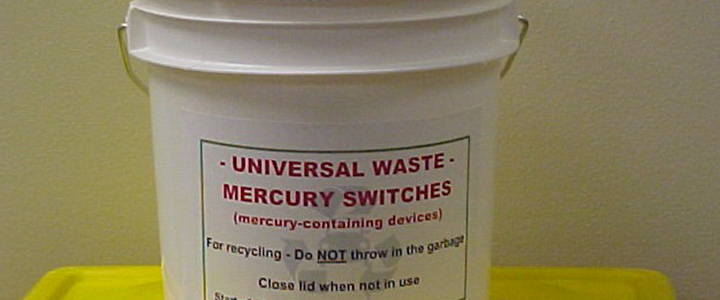
Universal Waste
Universal wastes meet the regulatory definition of hazardous waste but, during accumulation and transport, pose a relatively low risk compared to other hazardous wastes, when recycled. In New Hampshire, universal wastes include automotive antifreeze, aerosol cans, fluorescent lamps and other mercury-containing devices, cathode ray tubes (CRTs) from older TVs and computer monitors, certain types of batteries, and recalled or suspended hazardous waste pesticides regulated under the Federal Insecticide, Fungicide, and Rodenticide Act (FIFRA).
Check with your local transfer station to see if the facility accepts universal waste. If not, ask about your disposal options. Your local household hazardous waste (HHW) collection event or permanent facility may accept some or all of the universal wastes described below.
Are you a business? Visit our webpage for small/full quantity generators.
Aerosal cans
All products that are dispensed via an aerosol can come with a propellant which may include hydrocarbons, such as butane, or liquefied propane gas. The propellant, which helps spray the product out of the can, is considered hazardous waste. The product may also be hazardous if it is ignitable, corrosive, reactive or toxic.
Products that come in aerosol cans include hairspray, bug spray, shaving cream, spray whipped cream and cheese cans, paint, sunscreen, pesticides, cleaning products, lubricants, and other common household products.
Aerosol cans containing a hazardous product and/or propellant are a hazardous waste. If you need to get rid of aerosol cans still containing product, recycle them through a HHW collection event or permanent facility.
Empty aerosol cans are not considered a hazardous waste and can be disposed of in the regular trash or recycled as scrap metal. Only use the product for its intended purpose; do not vent cans to empty them.
- Aerosol Cans: Hazardous Waste Determination
- Fact Sheet HW-37: Universal Waste: Aerosol Can Management for Businesses
Automotive antifreeze
Antifreeze is used as an engine coolant and commonly consists of ethylene glycol or propylene glycol. Antifreeze breaks down over time and forms acids, which corrode the vehicle’s cooling system. During its use, antifreeze may become contaminated with traces of fuel, metal particles and grit. Benzene, lead and other hazardous constituents may cause used automotive antifreeze to be characterized as a hazardous waste.
Antifreeze can be recycled or disposed at a local transfer station, automotive shop, motor vehicle recycling facility, or a HHW collection event or permanent facility.
Batteries
Batteries currently contain one or more of the following eight metals: mercury, cadmium, lead, zinc, manganese, nickel, silver and lithium. These include nickel-cadmium, lead-acid and lithium batteries. Certain batteries are considered universal waste including most rechargeable batteries, wet-cell batteries, and some types of button cells.
Learn how to recycle different types of batteries.
Fact Sheet HW-23: All About Batteries
Cathode Ray Tubes (CRTs)
Cathode Ray Tubes (CRTs) are glass tubes containing lead that are found in older TVs and computers. CRTs are banned from disposal in landfills and incinerators. However, most transfer stations will take them for recycling. Check with your local transfer station or the NHDES list of computer and television recyclers.
Fluorescent light bulbs and other lamps
Lamps, also referred to as “universal waste lamps,” are the bulb or tube portion of an electric lighting device. Lamps are specifically designed to produce radiant energy, most often in the ultraviolet, visible, and infrared regions of the electromagnetic spectrum.
All fluorescent lamps, including compact fluorescent light (CFL) bulbs, contain mercury and, by law, cannot be disposed in a landfill or incinerator. Other examples:
- Green-tipped lamps.
- High intensity discharge lamps.
- Neon lamps.
- Mercury vapor lamps.
- High pressure sodium lamps.
- Metal halide lamps.
Universal waste lamps/bulbs can be recycled at local transfer stations, hardware stores and household hazardous waste collection events or permanent facilities. Check for your local options.
LED and incandescent light bulbs do not contain mercury and can be put in the regular household trash.
- Fluorescent Lightbulb Recycling & Disposal Options

- Clean-Up Broken Bulbs and Household Mercury Spills
- Fact Sheet HW-28: Universal Waste Lamps: Information for Small Businesses

Mercury-containing devices
Mercury-containing devices are banned from disposal in landfills and incinerators. This includes thermostats, fluorescent lamps, compact fluorescent lightbulbs (CFLs), thermometers (silver ones), tilt switches, and button batteries.
Visit the NHDES Mercury webpage to learn about the impacts of mercury, disposal and recycling, and how to cleanup broken devices that contain mercury.
Pesticides
Certain pesticides including recalled and suspended/cancelled pesticides regulated under the Federal Insecticide, Fungicide, and Rodenticide Act (FIFRA) are considered universal waste.
Have a question about pesticides? Call the New Hampshire Department of Agriculture, Markets & Food; Division of Pesticide Control at (603) 271-3550.
Questions?
Households and municipalities should contact the NHDES HHW Program via email hhw@des.nh.gov or (603) 271-2047. Learn more about hazardous waste.
Businesses seeking information about universal waste disposal please contact the NHDES Hazardous Waste Bureau by email at hwcomp@des.nh.gov or phone at (603) 271-2942.
Visit our Managing My Waste page to learn about other types of household waste.




